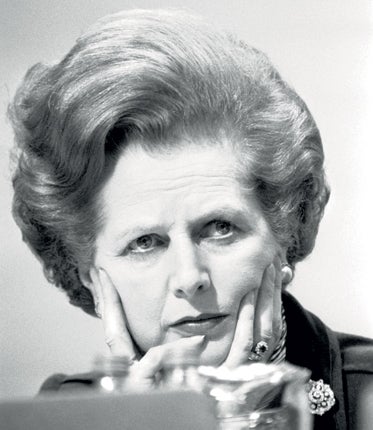Secret papers reveal Thatcher's fury during 1980 crisis

Your support helps us to tell the story
From reproductive rights to climate change to Big Tech, The Independent is on the ground when the story is developing. Whether it's investigating the financials of Elon Musk's pro-Trump PAC or producing our latest documentary, 'The A Word', which shines a light on the American women fighting for reproductive rights, we know how important it is to parse out the facts from the messaging.
At such a critical moment in US history, we need reporters on the ground. Your donation allows us to keep sending journalists to speak to both sides of the story.
The Independent is trusted by Americans across the entire political spectrum. And unlike many other quality news outlets, we choose not to lock Americans out of our reporting and analysis with paywalls. We believe quality journalism should be available to everyone, paid for by those who can afford it.
Your support makes all the difference.Unemployment is rising, the Government's programme of brutal public spending cuts is hurting millions and cash-strapped captains of industry complain of imminent collapse. It might sound like 2010 but this was 1980 and Margaret Thatcher responded to concerns that her economic medicine was not working with ill-tempered vigour.
Previously unpublished records show that as unease spread throughout Whitehall 30 years ago at the severity of the new Conservative government's austerity measures, Mrs Thatcher wielded her handbag with even more energy behind the scenes than suggested by her "the lady's not for turning" public persona, engaging in a row with her own Chancellor and the Governor of the Bank of England, as well as lashing out over fish quotas and Brussels bureaucrats.
The secret documents released by the National Archives in Kew, west London, reveal how the former Prime Minister accused Governor Gordon Richardson of undermining her economic strategy by "shovelling" money to British companies. She criticised Chancellor Geoffrey Howe for consistently failing to get his sums right with public borrowing.
Rather than seeking ways to attenuate the impact of the budget cuts, which had seen unemployment reach 2.8 million and inflation peak at 22 per cent, Mrs Thatcher's Cabinet quietly drew up proposals for further capital-raising measures, including charging for visits to GPs and cutting old-age pensions. The plans were dropped after ministers decided they might end in riots.
The papers, released under the 30-year rule, reveal how Mrs Thatcher was under intense pressure by the summer of 1980 with little sign that her harsh economic policy was working. She was bolstered during a short holiday at Lake Zug in Switzerland, during which a group of Swiss bankers offered assurances that her policies were sound. The problem, she was told, lay in their implementation.
The Prime Minister returned from her break and fired off memos to Mr Howe and Mr Richardson, stating that Britain's money supply was "out of control" and added she was "not seeking explanations, but prescriptions for action". When the Governor replied that Mrs Thatcher "did not properly understand where the figures had gone over the top", the Iron Lady revealed her fury, stating that "the centrepiece of Government strategy was being undermined by her own supporters".
The extent of the breakdown in relations at the heart of the most important triumvirate in economic policy was underlined in a note by one of Mrs Thatcher's private secretaries, Mike Pattison: "Relations with the Chancellor are not good at present, and with the Governor are appalling – at least in the PM's eyes."
Mrs Thatcher's trademark obduracy was even more emphatically expressed when it came to her favourite foe – Brussels. The documents show that the Prime Minister rejected out of hand any suggestion that Britain should compromise in negotiations over the Common Fisheries Policy (CFP) to manage stocks in the European Union.
Attempts by Agriculture minister Peter Walker to explain in a memo why it was in the United Kingdom's interest to reach a rapid settlement were annotated by Mrs Thatcher with the word "no" at five points before she scrawled on another letter related to the issue: "It's our water and our fish. Don't give them away." But a request that her press team mount a "good news" campaign was rejected.
Diplomat's Reagan worries
The relationship between Margaret Thatcher and Ronald Reagan was one of the great political romances of the late 20th century but, for British diplomats, at least, it was not love at first sight.
Following the election of the 69-year-old former Hollywood star as the US President in 1980, Britain's ambassador to Washington expressed concern that Mr Reagan lacked "mental vitality".
Sir Nicholas Henderson wrote: "[He] believes there are simple (not to be confused with easy) answers to complex problems. The main worry about him, however, is not just age but whether he possesses the mental vitality and political vision necessary to cope with the acute and changing problems... of governing this vast country."
Mrs Thatcher was less concerned.
Subscribe to Independent Premium to bookmark this article
Want to bookmark your favourite articles and stories to read or reference later? Start your Independent Premium subscription today.
Join our commenting forum
Join thought-provoking conversations, follow other Independent readers and see their replies
Comments